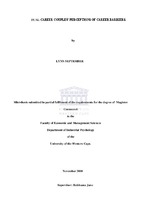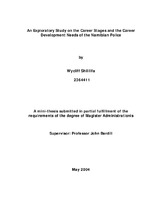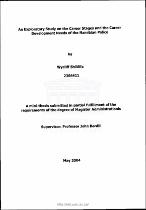Career indecision amongst undergraduate university students at an academic institution in the Western Cape
Abstract
One of the most important decisions adolescents are confronted with in the transitioning period from high school to tertiary institutions, is making career decisions. Young adults and adolescents may experience high levels of stress when they are expected to make decisions pertaining to a desired career. The stressful period may be too overwhelming for them.As a result it may have adverse implications on the quality of their career choice. The applicability of career indecision amongst undergraduate university students is considered an inability to choose a university major or occupation (Brogan & Hiebert, 2006).According to Creed, Patton and Prideaux (2006), career indecision is linked to issues related to career development and problems in making career related decisions, society’s expectations and perceptions, as well as the role of the family which may have an impact on the student’s ability to make career choices. In a study conducted by Creed and Patton (2003) it was revealed that age, gender and career indecision were predictors of career maturity knowledge. Joordan, Smithard and Burger (2009) postulate that career indecision influences career related thoughts and career decisions and plays an important role in the way individuals formulate career goals. Gordon and Meyer (2002) are of the view that it is not atypical for individuals to experience a certain level of developmental career indecision, this may be resultant to not having adequate experience and sufficient knowledge pertaining to the world of work. Developmental career indecision amongst students is viewed as a wholesome state which may ultimately prompt the student to explore careers and set goals (Feldt,2010).Brown, Brooks and Associates (1996), delineate that a career choice is an act which replicate an individual’s motivation. This action compels the individual to work toward their goals and to achieve it. As students venture on attaining their goal (career choice) they are confronted with many challenges, some of which include the transition from secondary school to tertiary level and the adaptation to an academic environment.This emphasizes the importance of career guidance, and that it should not be neglected. Stead and Watson (1999) conducted a study on first year university students in the Western Cape which revealed that students from disadvantaged schools were unable to choose study directions at tertiary level due to negligence of not providing career guidance at school level.Resultant to this, students were not afforded the opportunity to make informed decisions pertaining to career choices. Brown et al. (1996) presume the more informed an individual is about career choices and their
abilities, the more likely they are to make career choices as they are more
prepared to do so.The current study aimed to examine career indecision experienced by undergraduate university students at an academic institution in the Western Cape. The study examined the differences in career indecision based on gender and age, it also examined the relationship between a lack of information and career indecision and lastly access to a career counsellor and career indecision. A biographical questionnaire and the Career Decision Making Difficulties Questionnaire (CDDQ) were administered to undergraduate university students. The sample (n = 224) consisted of first, second and third year male and female undergraduate commerce students. The results indicated that there are significant
differences in career decision making based on gender and age. In addition, the results revealed that there is a moderate relationship between lack of information and career indecision and findings also indicated a significant relationship between access to a career counsellor and career indecision.The results of the current study should however, be interpreted with caution as a convenience sampling strategy was utilized thus limiting generalizabilty to the broader population of students. Furthermore limitations are put forth and the study concludes with recommendations for further research and for academic institutions for consideration.
Collections
Related items
Showing items related by title, author, creator and subject.
-
Dual-career couples’ perceptions of career barriers
September, Lynn (2010)Research indicates that approximately fifteen years ago there were over three (3) million dualcareer couples representing 20% of dual-worker couples. It is expected that the amount of dual-career couples will continue to ... -
An exploratory study on the career stages and the career development needs of the Namibian police
Shililifa, Wycliff (University of the Western Cape, 2004)This exploratory study seeks to critically explore human resources development with regard to the career needs and stages of the Namibian Police (NAMPOL). Documents were perused on the issue of the current human resources ... -
An exploratory study on the career stages and the career development needs of the Namibian police
Shililifa, Wycliff (University of the Western Cape, 2004-05)This exploratory study seeks to critically explore human resources development with regard to the career needs and stages of the Namibian Police (NAMPOL). Documents were perused on the issue of the current human resources ...




